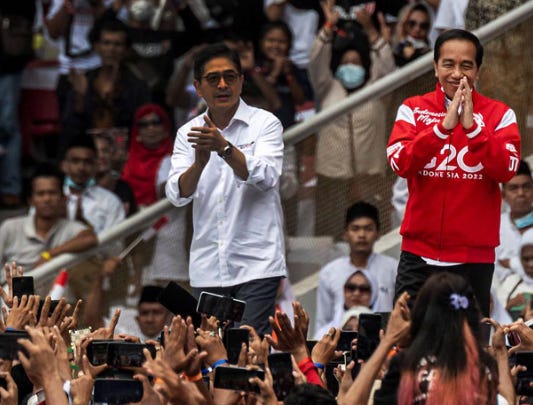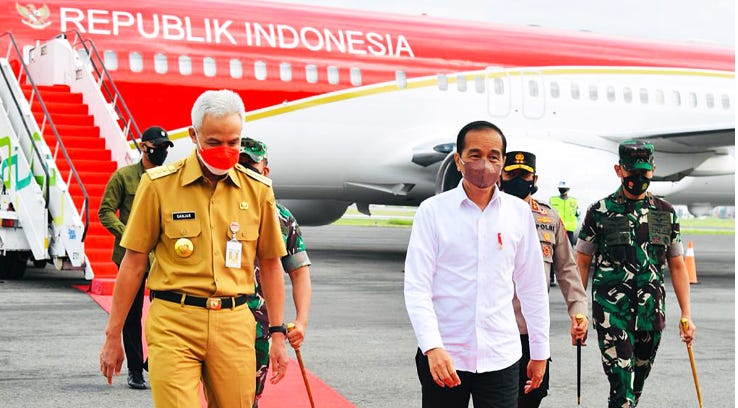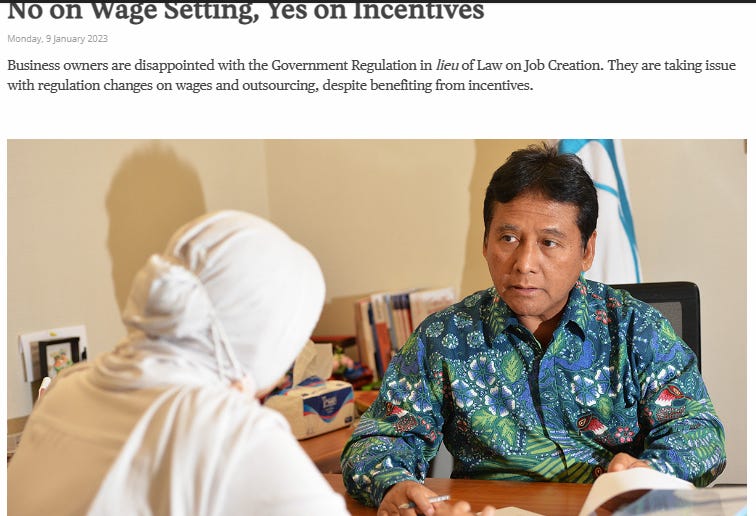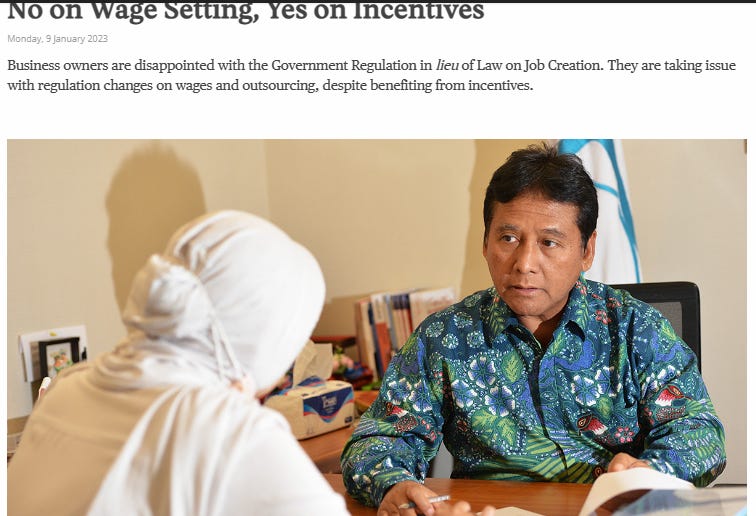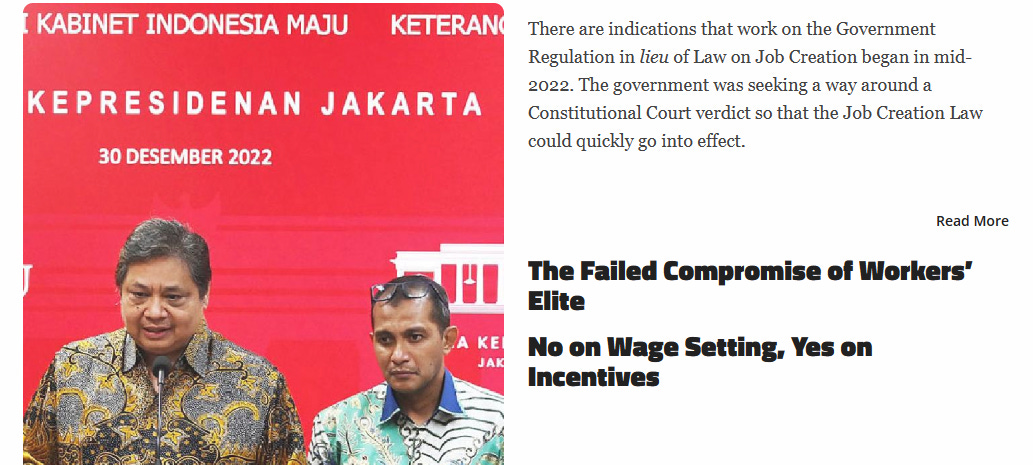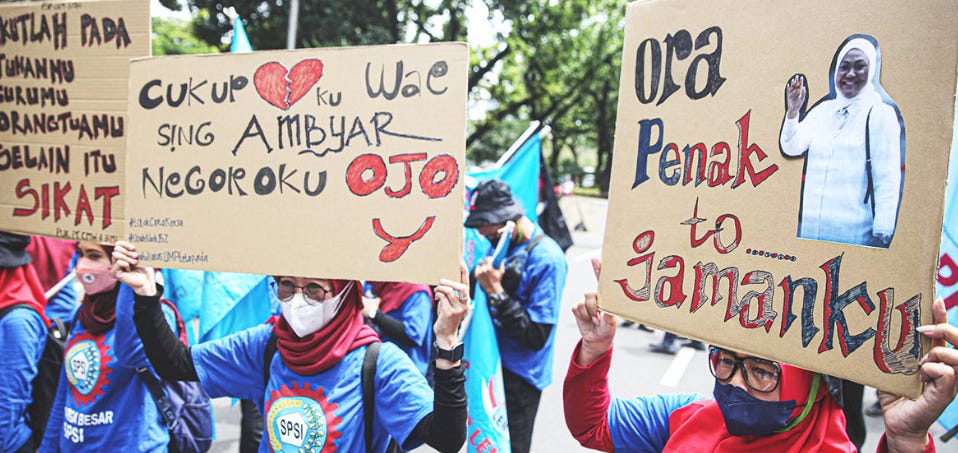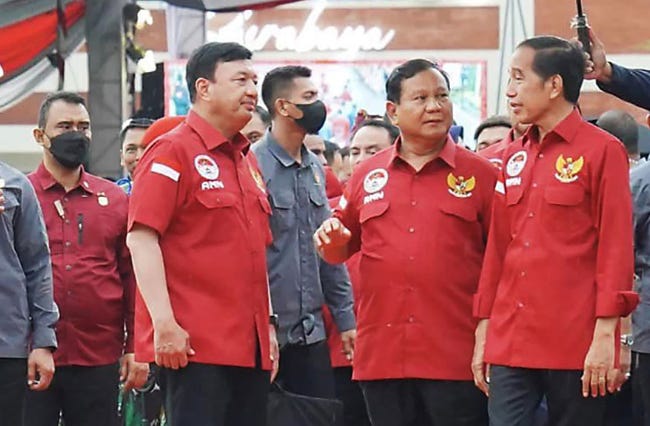Lieu, Industrial Park, and Omnibus (Ciptaker, Job Creation, Restructuring Tax)
Indonesia's Omnibus Law (Law No. 11 of 2020 on Job Creation) was issued to bolster investment and create jobs by streamlining regulations and simplifying the licensing process to improve the ease of doing business in Indonesia. It is a sea change for anyone doing business, investing and working in Indonesia.
Key Findings / tracks key changes under the Omnibus Law and its implementing regulations.
WHY IT MATTERS:
This opens the second act of the Omnibus Law following the scrutiny by the Constitutional Court of the formalities in the creation of the original Job Creation Law which was issued in 2020. Content-wise, the 1,117-page Job Creation GRL is a non-identical twin sibling of the original Job Creation Law with substantive changes on halal certification, employment, taxation, and regional government as well as some non-substantive changes in other sectors such as water resources. The substantive changes on halal certification and employment, changes in water resources, etc
STATE OF PLAY:
The Perppu Ciptaker amends all four (4 laws regarding manpower, much like the original Job Creation Law. However,
Short Term Employment Agreement (Perjanjian Kerja Waktu Tertentu, "PKWT")
The Job Creation Perppu does not regulate the contract period. It is interesting to note that workers have voiced their rejection towards this, reasoning that this allows employers to repeatedly create short term employment agreements. On the other hand, Law No. 13 of 2003 regarding Manpower ("Manpower Law") regulates the contract period.
Severance Pay
The Perppu Ciptaker does not amend the provisions regarding severance pay. Workers or laborers who experience layoffs will still receive severance pay, long service pay, and also compensation money in accordance with statutory regulations. Victims of layoffs can receive severance pay depending on their length of service, with a maximum severance pay of 9 times their monthly wage.
TAX
UU Cipta Kerja (The Omnibus Law of The Job Creation Act – officially Law Number 11/2020 on Job Creation, completely with government regulation in lieu of law (Perppu) on job creation No.2/2022). The upcoming government-initiated landmark bill on taxation is expected to simplify tax regulations and boost investment in Indonesia as it proposes corporate tax cuts and requires internet companies to pay taxes, albeit at the expense of lower tax revenue. The bill, a draft of which was obtained by introducing several major changes to the 2008 Income Tax (PPh) Law, the 2009 Value-Added Tax (PPN) Law, the General Taxation System (KUP) Law and the Regional Tax and Fees Law.
These changes aim to deregulate existing tax requirements to create a more open business climate and attract foreign funds as the country’s gross domestic product (GDP) growth cooled at 4.97 percent in the fourth quarter last year amid slowing exports and investment.
The following are among main points of the 29-article bill.
Income tax cut
Income Tax Aspects Withholding tax on bond interest paid to non-residents. Under the Omnibus Law, the government may reduce the withholding tax rate for interest paid to non-residents to be further directed under an applicable government regulation. GR-9 has done that by setting a lower interest rate of 10% (or the applicable tax treaty rate) for interest paid on bonds. This lowered rate applies to all types of income treated as bond interest, including capital gain (i.e. premium and discount) enjoyed upon disposal, and will be effective after six months of the effective date of this GR (i.e. lower rate goes into effect on 2 August 2021). Prior to this effective date, the existing GR-164 still applies for the interest treatment on bond transactions.
The Omnibus Law also provides that dividends paid by an Indonesian company is not taxable in the hands of the recipient if they are: • Domestic tax resident individual taxpayers who reinvest the dividend income in Indonesia within a certain period; or • Domestic tax resident corporate taxpayers. The Indonesian company distributing the dividends no longer will have a withholding tax requirement (i.e. does not need to withhold tax from such dividends even in the case of individuals that might not meet the reinvestment condition). However, if the individual taxpayer does not meet the reinvestment requirements, the dividend will be subject to income tax which must then be settled by the individual. Further stipulation on the reinvestment and self-payment mechanisms will be governed in a separate Indonesia Minister of Finance regulation.
The sweeping omnibus bill, cut corporate income tax to 22 percent in 2021 and 20 percent in 2023 from the current 25 percent. World Bank acting country director for Indonesia Rolande Pryce said the government’s plan to relax corporate income tax, among other things, would reduce the tax-to-GDP ratio by 0.5 percent. “Without complementary revenue-raising measures, this will translate to less money being available to close the infrastructure and human capital gaps.
Indonesia Finance Minister Sri Mulyani Indrawati estimated the cut to lower tax revenue by up to Rp 86 trillion (US$6.27 billion) annually. Though we’ll cut the corporate tax rate, we will widen our tax base and maximize our spending so there is no economic shock,” Sri Mulyani statemenr. “This effort must be maintained because there is a global economic slowdown.”
The gradual cut, however, will allow companies to have more room for expansion, such as by hiring more workers, according to the finance minister. Publicly listed companies that meet certain criteria will also get an additional 3 percent cut below the general rate, according to the bill’s draft. Tax for digital companies Digital companies such as Netflix and Spotify, with a significant economic presence, regardless of where they are based, will be considered permanent establishments and will be subject to local rules.
The significant economic presence will be determined through the companies’ gross circulated product, sales and/or active users in Indonesia. They will have to charge 10 percent value-added tax on their customers for buying or using their products or services as well as pay income tax to the government.
The companies can appoint representatives in Indonesia to collect, pay and report their taxes. Further detailed provisions on the value-added tax will be regulated in a finance ministerial regulation while those of the income tax will be stipulated in a government regulation.
The bill stipulates that if the government cannot declare a digital company a permanent establishment due to the existence of a tax treaty with a certain country, it then will charge an electronic transaction tax on the company’s sales in Indonesia.
Further provisions on the electronic transactions tax will be regulated in a government regulation (PP). “The bill will expand the tax base, not only for companies with a physical presence but also those that have significant economic presence [in the country] ,” the Finance Ministry’s taxation director general, Suryo Utomo explained.
The bill stipulates further that the communications and information minister can cut the digital companies’ internet access if they do not pay local taxes based on the request of the tax authority, according to the bill. The introduction of VAT on streaming services in Indonesia, as well as the OECD’s proposed global tax reforms.
Government to be given power to overrule regional tax rates
According to the bill’s draft, the government will unify regional taxes and impose fiscal punishments on regional administrations that impose bylaws deemed not in line with the national policy. The bill will provide the government a legal basis to impose sanctions, namely to delay and/or cut regional transfer amounts and/or other sanctions, according to the bill’s draft. If a regional administration’s policies are not in line with the national fiscal policy then we will impose sanctions, such as by [cutting] the regional transfer amount or revoking the bylaws.
The Finance Ministry’s fiscal balance director general, Astera Primanto Bhakti, said. “This will prevent excessive tax collection from businesses by regional administrations.” Read also: Government to unify regional taxes, punish recalcitrant administrations Regional Autonomy Watch (KPPOD) executive director Robert Endi Jaweng said of 347 problematic bylaws found by the group's research, 251 were related to taxation and levies.
"There are a lot of cases in which regional administrations collect so many taxes without providing worthwhile services.".
However, the Constitutional Court in 2017 prohibited the central government from annulling regional bylaws and instead gave the authority to the Supreme Court.
Foreign nationals to pay taxes only on income generated in Indonesia
The omnibus bill on taxation will ease tax requirements for expatriates and overseas Indonesians as they would no longer be taxed on income earned outside the country’s borders. Foreigners who work in Indonesia for more than 183 days a year will be taxed on only the income they earn in Indonesia, while Indonesians working abroad for more than 183 days will be exempt from paying income tax in Indonesia under certain conditions such as their domiciles, place of main activity and tax subject status. Read also: No permits required by foreigners in start-ups The prevailing Income Tax Law only regulates that individuals, including foreigners, who have resided in Indonesia for more than 183 days within a 12-month period, or resided in Indonesia for a full tax year, are considered a domestic taxpayer.
Otherwise, the individual is considered a foreign taxpayer and is not obliged to pay income tax in Indonesia. Suryo said the new stipulation was meant to provide certainty for foreigners and Indonesian diaspora living abroad. “Only income generated in Indonesia will be subject to tax for foreigners […] Members of the Indonesian diaspora who have been working for more than 183 days abroad will only be subject to taxes abroad.”
Elimination of dividend tax and implementation of lower penalty The omnibus bill will remove tax on dividends gained from home and abroad as long as they are reinvested in Indonesia, according to the bill’s draft. It will also remove tax on some income from foreign businesses, including dividends obtained offshore as long as the amount is invested in Indonesia during a certain period of time. The investment could be in the form of expansion, improvements to production capacity and the recruitment of skilled workers. “We are hoping that through this regulation, the dividend will be distributed to shareholders and the money be used for further investment,” Suryo told. “For investors, this is good news as their investment profits are no longer subject to any income tax,” said Paramadina University researcher Muhamad Ikhsan.
Furthermore, the bill will also reduce the penalty on late tax payments to a benchmark interest rate determined by the finance minister that is then divided by 12 months. The penalty for missed tax payments, meanwhile, will be calculated based on the benchmark rate plus 5 percentage points and then divided by 12 months. Penalty for taxpayers who have misstated information in their tax filing is calculated from the interest rate plus 10 percentage points, then divided by 12 months. The bill’s penalty calculation examples show interest rates of around 0.4 percent per month, far lower than the current penalty rate of 2 percent per month of the amount of unpaid taxes.
Foreign Manpower
Article 42 paragraph (1) of the Perppu Ciptaker explains, every employer who employs foreign manpower is required to have a plan for using foreign workers which is approved by the Central Government. It should be noted that this faced rejection from the labor party and requested that there must be written permission from the minister or official appointed to be responsible for foreign manpower.
INSIDE THE SAMPLE SITUATION: Central Java
Central Java Governor Ganjar Pranowo has launched the construction of the 400-hectare Jateng Valley in East Ungaran, Semarang regency — touted as the largest integrated tourist site in Southeast Asia. And create a lot of jobs. Another (existing) job creation is PLTU Batang. PLTU Batang or Batang power station, is a 1,900-megawatt (MW) coal-fired power station in Central Java.
The project will use ultra-supercritical technology, which offers combustion efficiency of 43 percent. The relative reduction in carbon dioxide emissions provided by the high efficiency of the combustion technology has been cited by Japan's prime minister Shinzo Abe, among others, as an argument for constructing the plant.[41] According to the Nikkei Asian Review, promoting of ultra-supercritical technology as a climate change solution is linked to Japanese government efforts to assist Japanese businesses against Chinese rivals for coveted overseas power plant construction contracts. "We want to make the Central Java project a showcase that will open the door to more projects," said an official at Japan's Ministry of Economy, Trade, and Industry.
Central Java Governor Ganjar Pranowo’s ambition to turn his province into a new base for labor-intensive manufacturing is now one step closer to being fulfilled. The government has decided to develop a 4,000 hectare integrated industrial estate in Batang, which lies on the province’s northern coast, with the assistance of more than six state companies. President Joko “Jokowi” Widodo and several ministers visited Batang on Tuesday as parts of the city will be further developed to accommodate plants relocating from China. Investment Coordinating Board (BKPM) chairman Bahlil Lahadalia said the board had succeeded in convincing seven foreign investors to relocate their factories from China to Indonesia.
Three are to be built in Batang. Seventeen other investors in China are reportedly finalizing plans to relocate their facilities to Indonesia. Industrial parks in major cities such as Jakarta, Bandung in West Java, Surabaya in East Java, Medan in North Sumatra and Batam have shown that well-planned industrial estates — supported by adequate infrastructure such as easy access to airports and seaports, power, warehouses, training facilities, residential areas and commerce — can attract manufacturing investors. Potential investors should be especially attracted to Central Java because the price of land there is much lower than in Jakarta, and the province’s minimum wage is among the lowest in the country.
Although Jakarta and the surrounding West Java and Banten industrial zones are better connected to global supply chains, their ports and roads have become increasingly congested. Another crucial factor is Ganjar, who has gone the extra mile in his efforts to expedite permits and land acquisition. State-Owned Enterprises Minister Erick Thohir said last week that at least six state companies would help develop infrastructure for Batang. But we wonder how much more those firms could prudently borrow as they are overburdened by debt. We also wonder why the government has chosen Batang, which is currently less prepared to accommodate manufacturing relocated from China than the more developed Brebes Industrial Estate (KIB) or Kendal Industrial Park (KIP).
About a month ago, Industry Minister Agus Gumiwang Kartasasmita said during a visit to several factories in Brebes, “We are now seriously negotiating with 21 United States and European pharmaceutical firms in China that intend to relocate their plants to Indonesia, and we will direct them to Brebes”. We are afraid that without concerted efforts and extraordinarily good coordination between state companies, the big talk about the plant relocation to Batang could end up being hot air. The company to develop Batang has yet to be incorporated. In fact, the three state companies that will directly develop Batang signed a memorandum of understanding on a joint venture only last Tuesday.
They are PT Perkebunan IX, the owner of the land, PT Pembangunan Perumahan and the Semarang-based PT Kawasan Industri Wijayakusuma (KIW). It may take more than two years to develop the industrial park and all the supporting infrastructure within the Batang estate. But that may be too long for investors intending to relocate their plants. We are in a rush and should compete with other Southeast Asian countries. Bahlil said the main reason for selecting Batang was land acquisition problems in Brebes. He argued there would not be any land problems in Batang because the 4,000 ha area was owned entirely by state plantation company PT Perkebunan IX.
Bahlil said investors could sign a long-term land lease in Batang at a very low price, while the land prices in industrial estates developed on private land could sometimes be between Rp 3 million (US$206) and Rp 4 million per square meter, compared to only Rp 1 million in Vietnam. KIW, the developer of the Brebes industrial estate, which is located on the northern coast near the border area with West Java, is also a state company. It is up to investors to decide which industrial estate to use for their plants, Bahlil said. But it is uncertain why the three foreign companies chose Batang, which has yet to be developed, and not the much more developed KIP, which has been in operation since 2016. Both Batang and Kendal are similarly close to Semarang’s Ahmad Yani airport, Tanjung Emas seaport and the Transjava railway and highway networks. “Land price is not the only or the most important factor considered by investors in choosing the location of plants,” said Juliani Kusumaningrum, Kendal’s head of sales and marketing.
The 2,700-ha KIP has been developed since 2012 by the Indonesian company Jababeka and the Singaporean company Sembcorp. Jababeka is the developer of the large Jababeka estate in Bekasi, West Java, and the Tanjung Lesung tourist estate in Banten. President Jokowi has designated both the KIP and Tanjung Lesung special economic zones (SEZ). Sembcorp has experience developing industrial parks in Batam, Bintan, Vietnam and China. The availability of trained workers is another caveat for Batang. It is inevitable that relocated plants would initially hire many skilled foreign workers at the supervisory level until enough locals can be adequately trained. But it is not yet certain how the BKPM and the Manpower and Transmigration Ministry will prepare trained workers for the incoming plants from China and how they will nurture the understanding of local trade unions. Demonstrations held over the past few weeks against two Chinese steel and nickel companies in Southeast Sulawesi for bringing in 500 licensed technicians from China could scare away potential investors.
Ganjar Pranowo also revealed that several companies from South Korea would relocate their factories in Vietnam to Central Java. According to him, these companies are part of the 97 companies that will move to the province. Ganjar also bragged that the area he leads has turned into an investment prima donna.
Ganjar claimed they would improve Central Java's economy through many job openings. "There will be 97 companies that are relocating to Central Java. The relocations will open hundreds of thousands of jobs," he said on Sunday. Ganjar also mentioned sports shoe producer Hwa Seung as one of the South Korean companies that will move their factories to Central Java. "They are relocating and able to accommodate 15,000 workers," he said.
BIG PICTURE:
A}
Changes to the Labor Law
Foreign workers
A company employing a foreign worker is still required to obtain a work permit (known as a plan to utilize foreign workers or Rencana Penggunaan Tenaga Kerja Asing (RPTKA)). However, a work permit is not required for a foreign worker who is, among other things, engaged by a start-up company, on a business visit or conducting research for a certain period.
Definite period employment
The Omnibus Law removes provisions on the permitted period of definite period employment under the Labor Law. However, the Omnibus Law states that further requirements on the type and nature of work, and the period and extension of a definite period employment agreement will be regulated in a government regulation.
The Omnibus Law requires employers to pay compensation to a definite period employee upon expiry of a definite period employment agreement. The compensation will be based on the employment period of the relevant employee. Further requirements on the compensation pay will be regulated under a government regulation.
Outsourcing
The Omnibus Law removes certain provisions on outsourcing under the Labor Law. However, the Job Creation Law stipulates that protection of workers in an outsourcing arrangement as well as the relevant business licenses for an outsourcing arrangement will be further stipulated in a government regulation.
Overtime
The Omnibus Law extends the maximum overtime hours to four hours a day and 18 hours a week. The maximum overtime hours, however, are not applicable for certain business sectors or work. As the Omnibus Law states that overtime hours and overtime pay will be further regulated under a government regulation, further clarification on certain business sectors or work that are not subject to the maximum overtime hours as well as the applicable maximum overtime hours that would apply for those sectors or work should be addressed in the government regulation.
Minimum wage
The Omnibus Law removes provisions of the Labor Law on sectoral minimum wage and the possibility for employers to defer the payment of minimum wages. However, it maintains the obligation of governors to determine the provincial minimum wage. A governor may also determine the minimum wage in certain regencies/cities within the province by taking into account the economic growth and inflation rate of the relevant regency/city.
Micro and small businesses are exempt from the minimum wage requirement.
Termination of employment
In general, there is no significant change in the procedure for termination of employment. However, under the Omnibus Law, if termination cannot be avoided, the employer must notify the employee and/or the union of its intention and the reason for termination. If the employee/union does not agree with the termination, the matter will be processed according to the industrial dispute settlement procedure (governed under Law No. 2 of 2004 on Settlement of Industrial Relations Disputes).
Employers are not required to provide notice of termination when the employment is terminated due to the employee's voluntary resignation, expiry of a definite period employment agreement, the employee reaching the applicable retirement age or the employee's death.
The Labor Law provisions that prohibited employers from terminating employment for certain reasons continue to apply. However, termination because an employee has a blood relationship and/or a marital relationship with another employee is no longer subject to an exemption (under the Labor Law, an employment agreement, company regulations or collective labor agreement could grant an exemption from this prohibition).
The Omnibus Law generally recognizes all reasons for termination previously regulated under the Labor Law. However:
The reasons for termination are no longer limited to those set out under the law because the Omnibus Law specifically states that an employment agreement, company regulations or collective labor agreement can set out other reasons for termination.
The Omnibus Law specifically recognizes a company's efficiency measures and a company being under a suspension of payment obligation (penundaan kewajiban pembayaran utang or PKPU) as reasons for termination.
The Omnibus Law does not specifically require the issuance of warning letters for termination due to an employee's violation of the employment agreement, company regulations or collective labor agreement.
Instead of specifying certain conducts of an employer that an employee can use to initiate the termination of employment (e.g., assaulting the employee and not paying the employee's salary), the Omnibus Law generally provides that the employment can be terminated if the employer's conduct harms the employee.
Further requirements and procedures for termination of employment will be regulated under a government regulation.
Unlike the Labor Law, the Omnibus Law does not include specific provisions on the termination payment formula that correspond with the reason for termination. However:
The Omnibus Law still requires employers to pay employee severance pay, long service pay and compensation of rights in the event of termination. The previously regulated minimum calculation of severance pay and long service pay under paragraphs (2) and (3) of Article 156 of the Labor Law are now the maximum amount of severance pay and long service pay under the Omnibus Law. Further, housing and medical compensation (which was calculated at 15% of the total severance pay and long service pay) is no longer an element of compensation of rights.
Further requirements on severance pay, long service pay and compensation of rights will be regulated under a government regulation.
B}
Amendment to the Social Security Law
The Omnibus Law introduces a new social security program, i.e., jaminan kehilangan pekerjaan or unemployment security. This newly introduced program will be administered by the Manpower Social Security Organizing Agency (Badan Penyelenggara Jaminan Sosial (BPJS) Ketenagakerjaan).
Terminated employees are entitled to benefits from the unemployment social security program in the form of cash, access to information on the job market and job training.
The implementation of the unemployment security program will be further regulated under a government regulation.
C}
Implementing Regulations
The Omnibus Law provides that the relevant implementing regulations, including government regulations, must be issued at the latest three months after the enactment of the Omnibus Law.
The existing implementing regulations of the Labor Law and the Social Security Law remain effective to the extent they do not contradict the provisions under the Omnibus Law. These implementing regulations must be harmonized with the provisions under the Omnibus Law at the latest three months after the enactment of the Omnibus Law.
LAND, PERMIT
Indonesia has one of the most complex and diverse land-law systems in the world, with the principal legislation in the sector continuing to be the Basic Agrarian Law, which has remained unchanged since its enactment in 1960. Given the various developments in the property sector that have taken place since then, the Government has availed of the opportunity presented by the Omnibus Law.
The principal land titles/rights and aspects that are covered by the Regulation are
(a) Land Management Rights (Hak Pengelolaan / “HPL”);
(b) Cultivation Rights (Hak Guna Usaha / “HGU”); Building Rights (Hak Guna Bangunan / “HGB”); Use Rights (Hak Pakai, “HP”);
(c) Apartment Unit Freehold (Hak Milik atas Satuan Rumah Susun / “HMSRS”);
(d) HGB, HP and HPL for the space above and below land; and
(e) land registration.
The Regulation revokes: (i)Government Regulation No. 40 of 1996 on HGU, HGB and HP; (ii)Government Regulation No. 103 of 2015 on Ownership of Homes and Residential Property by Foreigners Domiciled in Indonesia; and (iii) certain provisions of Government Regulation No. 24 of 1997 on Land Registration.
The implementing regulations for each of the revoked government regulations remain in effect in so far as they do not conflict with the Regulation.
Land Management Right (Hak Pengelolaan / “HPL”) is a right or title to manage state land, including to use such state land, that may be granted by the central government to a government authority or agency, including a local government or state enterprise, which may in turn sub-grant the right to use the land to a third party .
HPL is now governed by the Omnibus Law and the Regulation, whereas previously it was mainly dealt with by a ministerial-level regulation, which is lower in the legal hierarchy than a law. Thus, HPL now has a firm statutory basis. Other than this, the Regulation makes few changes to the existing HPL regime.
HPL over state land may be granted to central government bodies, local governments, state and local-government enterprises, state and local-government legal entities, the new national Land Bank Agency, and legal entities designated by central government.
An HPL holder may use the land itself or in collaboration with a third party; and is entitled to determine the fee or other contribution to be paid or made by the third party. If HPL land is managed in collaboration with a third party, a land utilization agreement must be entered into by the HPL holder and the third party. In such circumstances, the third party may be granted a derivative land title (HGU, HGB or HP) over the HPL land – the derivative title in effect “piggybacks” on the HPL title. Legal acts involving the derivative title (such as the grant of a security interest over the derivative title or the transfer of the derivative title to a third party) must be accompanied by a recommendation from the HPL holder.
LEADER LOOK:
President Joko “Jokowi” Widodo presented a new year gift in the form of a government regulation in lieu of law (Perppu) on job creation. Signed on Dec. 30, 2022, Perppu No. 2/2022 replaced the Job Creation Law that in late 2021 was declared conditionally unconstitutional by the Constitutional Court (MK) and therefore had to be revised within two years in a process that must include meaningful public participation.
The Perppu is 1,117 pages long and consists of 186 articles with changes to several articles such as rules of employment, minimum wages and arrangements for outsourced workers. For example, the regulation eliminates the right to two days off in a week for workers as stipulated in Article 79 Paragraph (2b).
According to the regulation, workers deserve one day off the weekly break for six working days. Law No. 13/2009 on Employment regulates two days off a week for workers. Additionally, the jobs law says outsourcing can be open to all business sectors, but the regulation changes that to some sectors. According to the Manpower Ministry, the Perppu was issued because the state needs to ensure the citizens' rights to work and a decent living through the Job Creation Law. The government also sees the need for broad employment absorption as well as adjustments to various regulatory aspects relating to the facilitation, protection and empowerment of cooperatives and micro, small and medium enterprises (MSMEs). In addition, the regulation was said to implement the MK’s order for the revision of the Job Creation Law.
Coordinating Economic Minister Airlangga Hartarto insisted that the state of emergency behind the issuance of the Lieu of Law / Perppu was justified by the imminent global recession to the point of stagflation the country is facing. According to Airlangga, the crisis is a real threat for emerging markets like Indonesia, while a few developed countries have already come under the International Monetary Fund’s supervision. Therefore, the government needs to respond quickly to anticipate the storm. Airlangga also revealed the regulation was issued to provide legal certainty to investors and business players who had been waiting for the development of the Job Creation Law since the MK declared it conditionally unconstitutional. The Perppu has unsurprisingly sparked public criticism. Civil society groups said the regulation deprived the public of meaningful participation per the court’s order in the making of the Job Creation Law.
The intention of issuing such an “emergency regulation” is also questioned by the Commission for Missing Persons and Victims of Violence (KontraS). The group deems the regulation as a form of government act arbitrary, which contradicts the rule of law as it nullifies the MK’s ruling. KontraS therefore urges revocation of the Job Creation Law as well as the Perppu. A similar sentiment was shared by House of Representatives Commission IX Deputy Speaker Kurniasih Mufidayati of the Prosperous Justice Party (PKS). For years, since 2004 until now, PKS has had (intentionally) very strong presence at least in Commission VIII (religion issue, etc) and IX (Public Health, Halal Certification, Social Welfare).
She said President Jokowi had bragged about Indonesia’s economy among the Group of 20 countries, which indicated that all was well in the country despite the looming threat of a global recession. The Association of Indonesian Trade Unions (Aspek) suspects the Perppu would cost workers their job security and wage guarantee for the sake of investors. However, the Labor Party opts to play it safe.
The Indonesia Labor Party’s chairman Said Iqbal said they would not directly confront the government related to the Perppu because they believed that President Jokowi would listen to the workers’ aspirations and not force his will against workers. Instead, the party suspected Airlangga was behind the issuance of the regulation just to please Jokowi. What’s more Responding to the controversy, House Deputy Speaker Sufmi Dasco Ahmad said the House would only review the Perppu after the lawmakers resume their sitting on Jan. 10. Therefore, Sufmi said he would not comment about the regulation right now. Even so, Sufmi deems the issuance of the regulation did not break any laws, including Law No. 15/2019 on the Formation of Legislation. House Commission IX member Irma Suryani from the NasDem Party concurs, although she cannot be sure if the House will approve or reject the regulation.
The 1945 Constitution stipulates that the House must respond to a Perppu within 30 days after it reaches the legislative body, or else the regulation will become effective. In addition, Labor Party chairman Said Iqbal says if negotiation with President Jokowi over the matter proves to be unsuccessful, the party will file a judicial review against the Perppu with the MK. This move has gained support from law experts who agree that the regulation nullifies the MK’s orders. The House Legislation Body (Baleg) member Guspardi Gaus said the regulation was issued as a legitimate alternative of the government to act on the MK’s order to revise the Job Creation Law without wasting time on a much longer, complicated procedure and risking the effect of an imminent global recession.
Guspardi added that the legal void caused by the ruling meant there was an urgency to issue the Perppu. What we’ve heard According to an internal source in the government, although President Joko “Jokowi” Widodo issued the draft of the Perppu on job creation on Dec. 30, 2022, discussions regarding the draft had been conducted since the month of October. Another source from labor groups said Jokowi invited them to discuss the plan to issue the regulation on job creation. In this meeting, the labor groups had submitted a list of issues that needed to be revised to improve the Job Creation Law.
Additionally, the option of issuing the regulation as a Perppu rather than a law was also tabled. "Ahead of the political year, the law’s revision could certainly be neglected and suggestions from labor groups could also be ignored,” said this source. Apart from labor groups, the Job Creation Law familiarization task force is also said to have played a role in the formulation of the regulation. On Nov. 13, 2022, they held a meeting and invited legal experts to the Four Points by Sheraton Hotel in Bali, during which the government decided to amend the Job Creation Law. However, the meeting did not make an explicit recommendation to make a Perppu.
The source added that the legal experts had gathered in Bali on numerous occasions and had previously put forward three options regarding the Job Creation Law: Revise the articles being questioned by the Constitutional Court, overhaul the entire law, or issue a Perppu – which recently came to light. A lecturer in constitutional law at a private university in West Jakarta was one of the drafters of the Perppu and was said to be active in the task force’s meetings. According to the source, it was this lecturer who allegedly submitted a proposal for the government to issue a Perppu as a step in responding to the Constitutional Court's decision.
OVERSIGHT
Reading the long term of the Indonesian economy by looking at the momentum and even taking advantage of the momentum to quickly recover from bruising due to the pandemic requires adaptive policies.
The awkward: Jokowi actually hammered lowest rating ever his Presidency (since Oct 2014) in October 2022, but (according INDICATOR INDONESIA) in January 2023, abruptly get the highest ever rating approval.
The urgency arose because many regulations for existing businesses were still complicated and overlapping. As a result, this condition makes it difficult for entrepreneurs to set up or want to run their businesses. When investment increases, the impact will eventually lead to job creation which will reduce poverty or unemployment.
The Government Regulation in Lieu of Job Creation Law supports full employment conditions and seeks to absorb as much of the workforce as possible through investment instruments and labor market flexibility.
The Government Regulation in Lieu of Job Creation Law also seeks to create productivity and eliminate unnecessary costs. An example is the change in the calculation of the minimum wage which takes into account the rate of inflation and economic growth.
The government should not ignore, amid (current highest Jokowi approval rating) the pros and cons of Government Regulation in Lieu of Job Creation Law that emerged on the employment side. From the employment aspect, it becomes complicated and tangled because there are many interests at play. Solving the problem carefully and wisely is the key.
Previously, the Coordinating Minister (Menko) for the Economy Airlangga Hartarto assessed that the issuance of the Government Regulation in Lieu of Job Creation Law was very urgent and important in preventing an economic crisis from occurring.
Because of this, the former Minister of Industry pushed for the DPR to be able to approve the Government Regulation in Lieu of Job Creation Law to become law.
"In terms of the DPR RI being able to approve Perppu Number 2 of 2022 concerning Job Creation and agreeing on the Draft Bill on the Determination of the Perppu on Job Creation to Become Law," he said at a Government Work Meeting and the DPR RI Legislative Body regarding Perppu Number 2 of 2022 concerning Job Creation, on Tuesday, February 14 (7 days ago).




